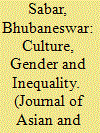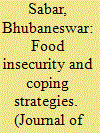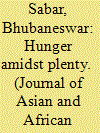|
|
|
Sort Order |
|
|
|
Items / Page
|
|
|
|
|
|
|
| Srl | Item |
| 1 |
ID:
188947


|
|
|
|
|
| Summary/Abstract |
This ethnographic paper explores gender inequality in tribal societies vis-à-vis customary practices and challenges the notion of egalitarianism of tribal society by taking Chuktia Bhunjia tribe of Odisha, India as an analytical category. In the light of a discussion on women specific taboos and restrictions, captured through formal interview, narrative and lived experience approach, the paper explicates the deeply embedded nature of the taboos in Chuktia Bhunjia society and unravels how prohibiting women from socio-economic and religious space, backed by purity-pollution philosophy, perpetuate the gender inequality among them. It was found that although economic division of labour is indistinct; women are perceived being portrayal of misfortunes during perceived pollution periods and are prohibited to enter into sacred places – kitchen room, cowshed, sacred groves and forest – and take part in community festivals and other auspicious occasions. The existing material culture, especially kitchen room, alongside economic structure, self-notion of ‘outsiders’ and apparently fixed customary laws have direct influence on the position of women in this society. It is found that the customary laws are not mere symbolic expressions in perpetuating the gender asymmetry, but have become a powerful tool to patriarchal controls not only over women’s education, health, properties and knowledge, but also over individual’s choice, freedom, decision-making and sexuality. However, internal challenges are reported against customary laws and taboos, the fear of social ostracism, the obligation to restore the purity of cultural entity and anxiety reinforce people to be always submissive to those practices. Therefore, unless there is transformation alongside their culture, it is fruitless to think of gender equality.
|
|
|
|
|
|
|
|
|
|
|
|
|
|
|
|
| 2 |
ID:
149489


|
|
|
|
|
| Summary/Abstract |
This paper explores the food insecurity level and coping strategies of two particularly vulnerable tribal groups (PVTGs) in India. It finds that despite the availability of resources, limited income always becomes a proxy for their food vulnerability because they cannot purchase food items outside state programmes. These groups traditionally adopt various coping strategies to overcome food insecurity at household level and these have become a structure and behaviour for ensuring food security
|
|
|
|
|
|
|
|
|
|
|
|
|
|
|
|
| 3 |
ID:
153652


|
|
|
|
|
| Summary/Abstract |
This paper illustrates how politics on resource entitlement have historically shaped the vulnerable condition of people in Nuapada district (formerly Nawapara sub-division of Kalahandi district) of Orissa, India. It finds that the underutilisation of existing resources in the district, backed by loopholes in district administration, has widened the vulnerability conditions of local people. The collapse of the state command economy during post-economic reform and the subsequent withdrawal of welfare state from welfare activities, which opens space for elite groups and middlemen to exploit both resources and local people, have caused serious disruption in the development of the district as evident from the declining livelihood options and increasing distress migration. Thus there is a need to bring reform in equitable distribution of resources at the state level.
|
|
|
|
|
|
|
|
|
|
|
|
|
|
|
|
|
|
|
|
|